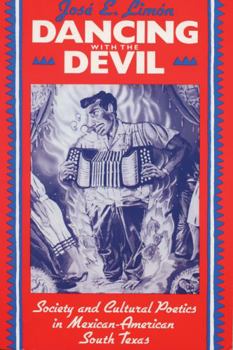Dancing with the Devil: Society and Cultural Poetics in Mexican-American South Texas
Select Format
Select Condition 
Book Overview
Combining shrewd applications of current cultural theory with compelling autobiography and elegant prose, Jos? E. Lim?n works at the intersection of anthropology, folklore, popular culture, history, and literary criticism. A native of South Texas, he renders a historical and ethnographic account of its rich Mexican-American folk culture. This folk culture, he shows--whether expressed through male joking rituals, ballroom polka dances, folk healing, or eating and drinking traditions--metaphorically dances with the devil, both resisting and accommodating the dominant culture of Texas.
Critiquing the work of his precursors-- John Gregory Bourke, J. Frank Dobie, Jovita Gonzalez, and Americo Paredes--Lim?n deftly demonstrates that their accounts of Mexican-Americans in South Texas contain race, class, and gender contradictions, revealed most clearly in their accounts of the folkloric figure of the devil. Lim?n's own field-based ethnography follows, and again the devil appears as a recurrent motif, signaling the ideological contradictions of folk practices in a South Texas on the verge of postmodernity.
Related Subjects
Anthropology Cultural Fairy Tales Folklore Folklore & Mythology Hispanic American Studies History Humanities Mythology & Folk Tales New Age, Mythology & Occult Occult Politics & Social Sciences Religion & Spirituality Religious Studies Social Science Social Sciences Specific Demographics State & Local





